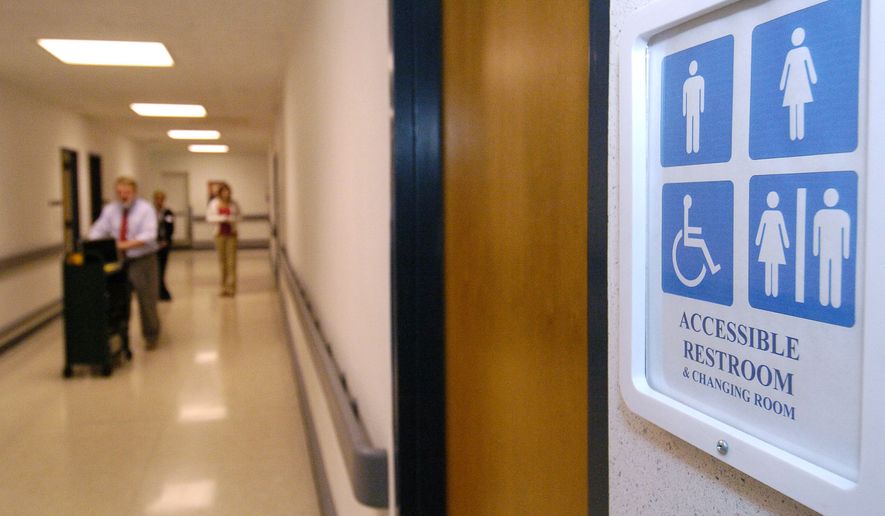Hundreds of parents and northern Virginia residents were outraged Thursday night when the Fairfax County Public School Board voted 10-1 with one abstaining to amend its nondiscrimination policy to include “gender identity” without consulting the parents and against the wishes of an overwhelming majority of audience members.
Concerned parents filled the auditorium at Luther Jackson Memorial middle school in Falls Church to attend the meeting with nearly one hundred more waiting outside to protest the amendment, which could lead to mixed-sex bathrooms and locker rooms in schools.
Those who opposed the policy amendment said the board made the sweeping change too quickly without consulting parents and without studying the implications of such a change.
“This isn’t over,” said Mychele Brickner, a former FCPS board member. “People are very disturbed by what just happened in there. They didn’t take parents into account. The fact that they passed a motion like this and created an additional protected class in the policy and then they are going to let people see later what this means, that’s ridiculous. That’s exactly what this happened with Obamacare.”
Although the affects of the new policy are unclear, many of the parents who attended the meeting are sure of one thing, the board’s lack of respect for their voices will determine who is re-elected in November.
“We will remember in November!” audience members shouted as they stormed out of the auditorium.
SEE ALSO: School transgender rights bill passes in Fairfax County, Virginia
Only 10 speakers were allowed a few minutes to debate the amendment, prompting frustrated parents to shout their disapproval. Board Chairwoman Tamara Derenak Kaufax threatened to empty the auditorium if rowdy audience member did not keep quiet.
Elizabeth Shultz, the only board member to vote against the amendment, said that the vote went exactly as she expected it to go and blasted her colleagues for pushing a political agenda without considering parents’ rights to be a part of the conversation.
“I think it is a sad statement that we can allow those decisions to be entrenched in political ideology or vague understandings of the implications of such policies,” Ms. Schultz said. “We are an education system, and we didn’t do our homework. We took the final exam and signed our name at the bottom and took some guesses.”
Ms. Schultz filed a motion to delay the vote until October to give the board time to review studies and answer questions about the specific implications of the change. However, her motion was defeated over lots of shouted objections from the audience.
In a statement released shortly after the vote, Ms. Kaufax applauded the measure, calling it a way to “provide an environment which promotes equality where every student and employee is treated with dignity and respect.”
“The School Board has taken this proactive step to protect our students and staff from discrimination,” Ms. Kaufax wrote.
But Ms. Schultz said that adding more and more protected classes to the policy would only create more problems.
“Let’s change the non-discrimination policy to two words: ’Don’t discriminate,’ ” Ms. Schultz said during her remarks before the vote to roaring applause.
Board member Megan McLaughlin defended the motion during the meeting, saying it was not a policy change but simply a policy update and said that school operations would not be affected.
“You’re children are safe today, they were safe yesterday, and they will be safe tomorrow,” she said.
Board member Ryan McElveen, who introduced the amendment, said that the amendment would simply set in stone the non-discrimination practices that are already being carried out by FCPS.
“The truth is we already do not discriminate against gender identity in practice,” Mr. McElveen said, adding that the amendment would reaffirm that practice.
“Then why change it?” audience member shouted repeatedly.
Some of the board members admitted that the district was mandated by the U.S. Department of Education’s Office of Civil Rights to add “gender identity” to the policy — or else risk losing federal funding.
“The federal government has been very clear that they expect local schools to amend their policies,” said John Foster, division counsel for FCPS.
Although attendees overwhelming opposed the measure, some audience members supported the amendment and lauded it as a crucial first step towards protecting transgender students and faculty.
“What happened here tonight may be a big step in making sure that a whole other population doesn’t have to get up in the morning fearing facing harassment,” said Gordon Baer, a former FCPS student and current co-chairman of the Gay Lesbian and Straight Education Network (GLSEN) of Virginia.
Mr. Baer said that he understood that most people at the meeting were opposed to the board’s sweeping implementation of the amendment but argued that setting firm gender identity language in the policy would provide a backing for the policy in practice.
However, along with a multitude of other questions surround the amendment, the language itself isn’t clear.
“They did not even define gender identity. What does it mean?” said Virginia Delegate Bob Marshall, who spoke against the measure in April.
Ms. Kaufax said FCPS will now hire a consultant to help develop regulations for the policy.
• Kellan Howell can be reached at khowell@washingtontimes.com.




Please read our comment policy before commenting.